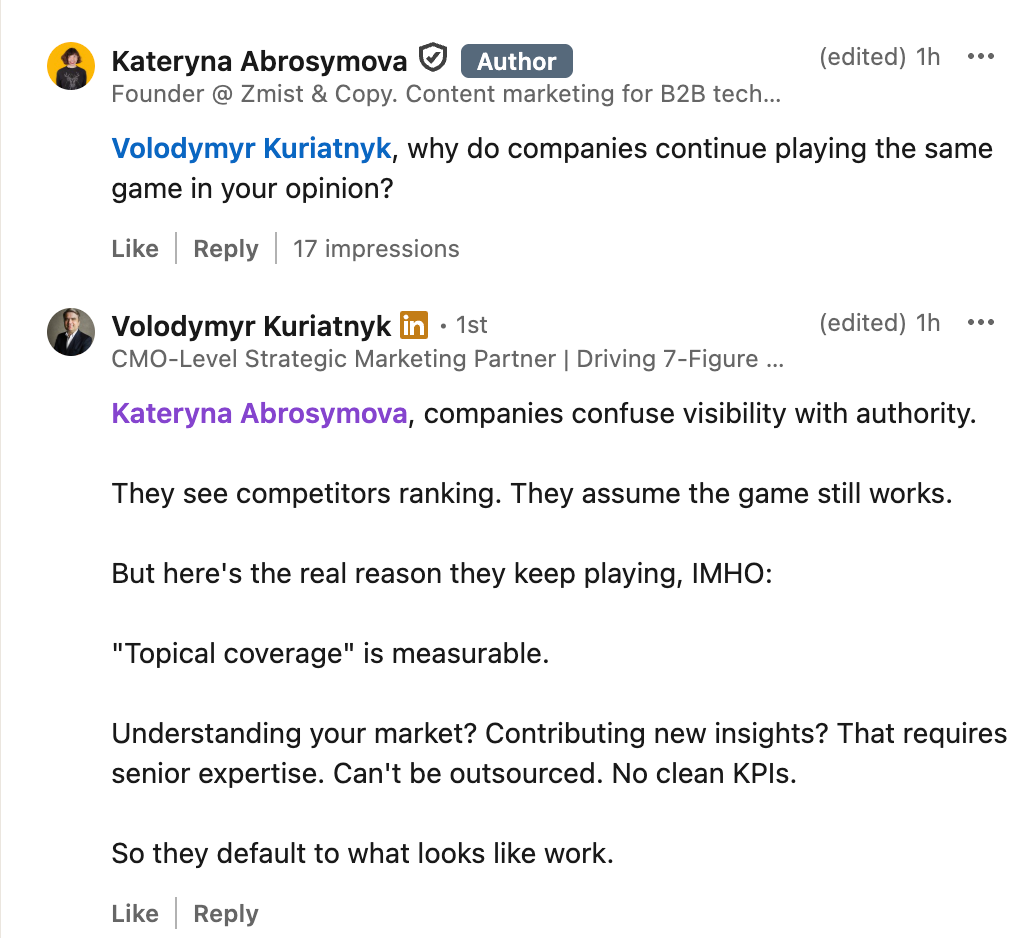From Reads to Leads is a newsletter for B2B tech founders and marketing leaders whose marketing isn’t working. It’s about positioning, messaging, content strategy, operations, and results. If this was sent to you, subscribe here so you don't miss the next email.
In today's newsletter:
Write 50 articles about project management. Cover every subtopic. Build your "topical authority." Google would reward your comprehensive coverage.
Most of your content was basic information: what is project management, how to create a Gantt chart, best practices for sprint planning. The same stuff everyone else wrote, just arranged differently.
But at least you wrote it yourself! That counted for something, right?
Now ChatGPT can generate those 50 articles in an afternoon. Every company in your space has "topical authority" because every company has access to the same AI that produces the same basic information.
Look at the chart below. The copycat SEO content the whole industry relied on to rank in search suddenly became worthless.

You can build “topical authority.” But you have no actual authority.
Actual authority means having expertise and ideas people give a damn about.
Most companies trying to build "topical authority" have none of that. They have a list of keywords and try to write “thought leadership” pieces by googling topics they've never experienced.
That's the SEO problem nobody talks about. When I posted about this on LinkedIn, someone made a great point about why companies keep chasing SEO even though AI changed the game:
They confuse visibility for authority and default to what looks like work, instead of spending time to understand their market and add new insights.

If you're not in that camp, let's figure out what being different actually requires.
An enemy worth fighting. Every strong POV starts with identifying what's wrong. If you can't name what you're against, you don't have a POV.
Expertise you can't fake. You need people who've actually done the work and found solutions that contradict conventional wisdom.
Evidence from the trenches. Your POV needs battle scars: examples of the old way failing, your way working, and why the difference matters.
Your differentiated point of view needs to show up everywhere:
You'll rank for fewer keywords.
But the people who find you will remember you. They'll share your content because it challenges what they thought they knew. They'll become customers because you're the only one saying what they've been thinking.
In a world where AI can generate unlimited content, the only competitive advantage left is having something worth saying.
What are you optimizing for?
I explained how to write content with a point of view in my Context Engine series. Check out this issue.
Kateryna
P.S. If we aren't connected already, follow me on LinkedIn and Instagram. If you like this newsletter, please refer your friends.
P.P.S. Need help with quality content? Zmistify your content with Zmist & Copy

So your writing gets ripped to shreds. Discouraged, pissed off, humiliated, vulnerable, what's your reaction? A) Tell the editor she's wrong and punch her in the face. B) Rewrite it. In this blog post, we’ll talk about why criticism is actually a good thing and how to respond when your client doesn’t like your writing.

"It’s important to argue logically because logic is an essential part of argumentation." Is this sentence logically sound? Not really. Logic can go wrong in many ways. And sometimes we don't even realize that the point we’re making isn’t that strong. Read this article to learn common mistakes in reasoning and how to avoid building bad arguments.
Subscribe to From Reads to Leads for real-life stories, marketing wisdom, and career advice delivered to your inbox every Friday.